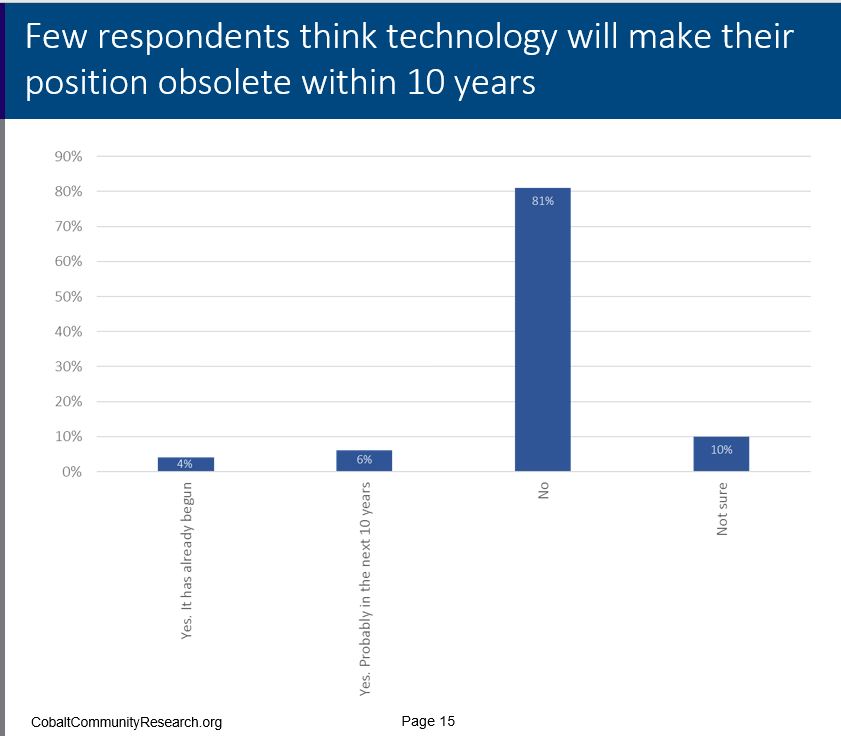Survey Shows Workers Aren’t Worried About Tech [GRAPH + TRANSCRIPT]
Metro Detroit agency got input on technology, job training, and workplace values.

Are you worried that technology will make your job obsolete? A new survey says most Metro Detroit workers don’t feel that way.
The Southeast Michigan Council of Governments conducted an online survey of people’s attitudes toward technology and new job skills. One of the questions asked respondents if they’re concerned about losing their jobs to technology within ten years. 81 percent said “no”. More than 400 people answered the survey, which also provided some insight on job training. SEMCOG Executive Director Kathleen Lomako says most people see the benefit of learning new skills, as long as it advances their careers and doesn’t cost them much money.
“Many people–about 40 percent–said they were only willing to do additional training if their employers pay for it.”–Kathleen Lomako, SEMCOG
The survey also found that most workers put a high value on hard work and problem solving skills. You can read the report at the bottom of this story.

SEMCOG’s Kathleen Lomako spoke with WDET’s Pat Batcheller. Click on the audio player to hear the conversation. Here’s a transcript:
Pat Batcheller: What was the purpose of your study?
Kathleen Lomako: The purpose of this was to get insight from the public in the region about their perceptions of what skills they need and how they’ll be useful in the future. The reason we’re doing that is because we’ve got a task force that’s looking at how we can make changes to our education and training systems, to make sure that they deliver a workforce that’s prepared to take all these open jobs.
Pat Batcheller: And what did the respondents tell you?
Kathleen Lomako: Well, surprisingly they told us that most of them are working in the field in which they’re trained. However, they needed to take additional training and education to function in those positions. It looks at the basic skills sets they’re trained at, and then ongoing training they need to stay up to speed. They also told us that while they’re interested in additional training, they’re pretty pragmatic and are willing to get additional training for career advancement. They’re willing to do it if it’s affordable, and many people–about 40 percent–said they were only willing to do it if their employer pays for it.
Pat Batcheller: What did they say about the skills that they think employers want most?
Kathleen Lomako: They didn’t talk to us about technical skills. What they shared with us is that they thought that their employers were interested in having a strong work ethic, having problem-solving skills, and that those were things that we think of more as soft skills or employability skills. It’s harder to teach those kinds of things.
Pat Batcheller: One of the things we know about today’s work force is that technology is constantly changing and people do need to adapt to changes as they get more education and training. Are they worried about becoming obsolete in the next few years because of technology?
Kathleen Lomako: We were surprised that there weren’t more people that were concerned about that. Few of the respondents think technology will make their positions obsolete, and a lot of the literature talks about that topic. What we’re thinking is we need to make sure that our workforce systems reinforce training and technology and that employees are able to adapt to changing technology. Another interesting fact is that technology is in every job now, and it’s getting easier to use. We’re hoping we can use these results–as well as our task force’s discussions and deliberations–to figure out a system of life-long learning, that says “yes, we need to have these skills, we’re going to have to be trained, and it’s going to have to be something we do throughout our lifetimes.
Pat Batcheller: You’re talking about the Future Skills Task Force. What is their mission?
Kathleen Lomako: Their mission is to figure out what kind of changes and support we need to make to ensure that we have a skilled and trained workforce. And the people who are on that task force include people in K-12 education, community college, workforce agencies, labor unions that operate apprenticeships and training programs. So it’s a broad range of people that deliver education.
Pat Batcheller: This was a survey of workers. Have you done similar research on employers, asking them what skills they’re looking for?
Kathleen Lomako: We have not, however, we’ve got a number of employ ers that are on this task force, so they’re bringing the challenges they find in terms of hiring skilled employees and what kind of training they have to provide to their employees to make sure they’re effective in their positions.
Viewing on mobile, Click here
